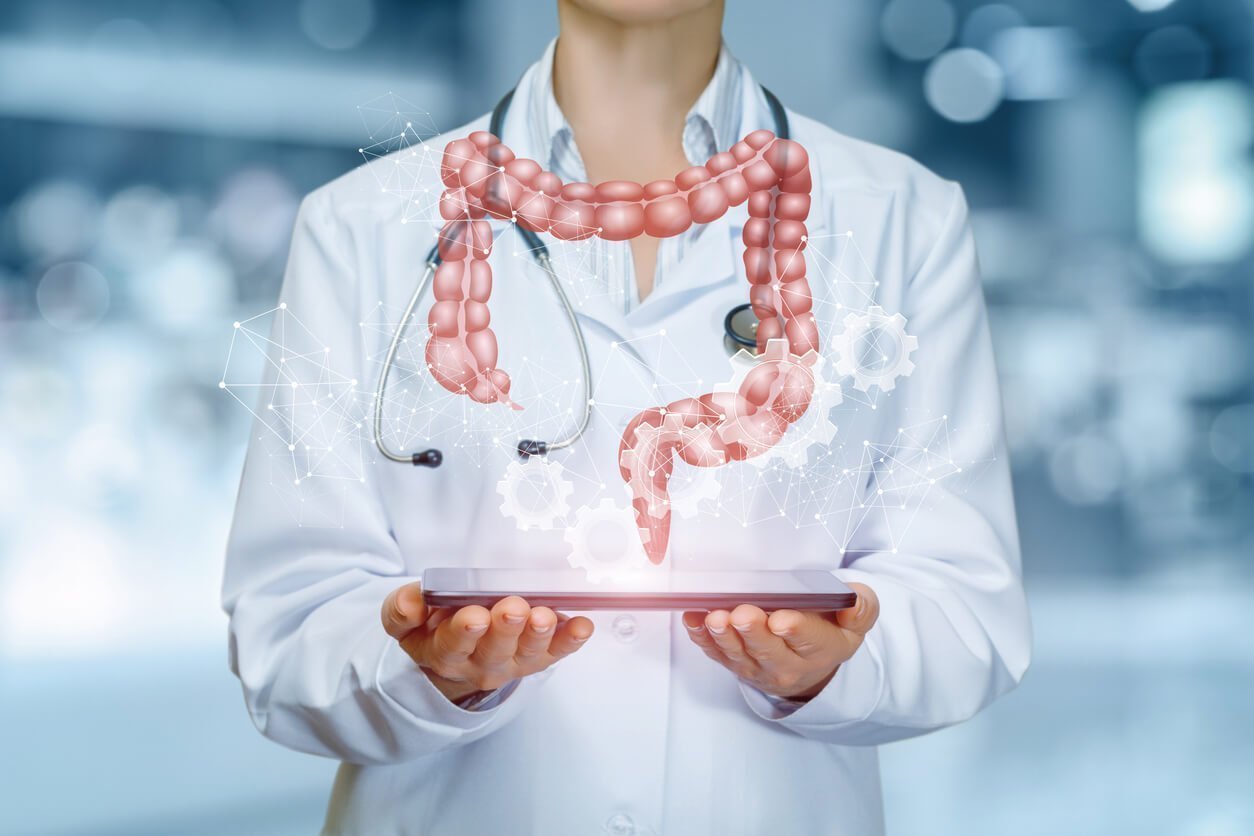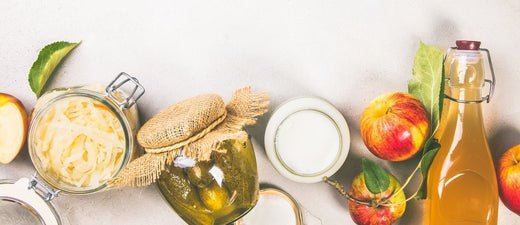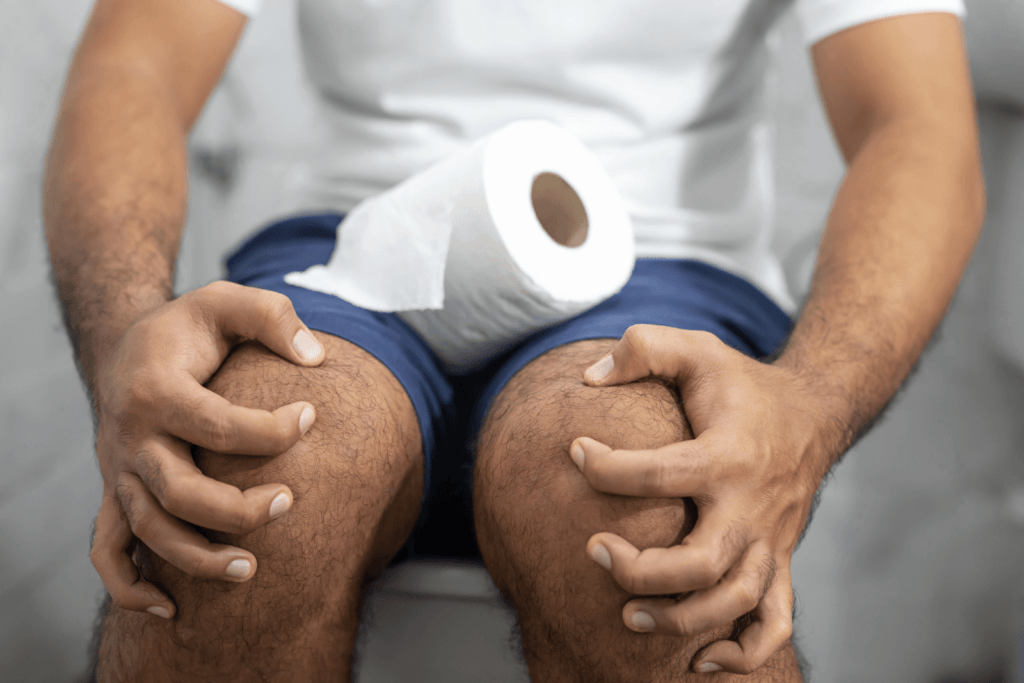Table of contents
- What are hard stools?
- This is how hard stools develop
- Is hard stool the same as constipation?
- Causes of hard stools
- What helps against hard stools?
- Treatment options for hard stools
- Hard stools in children and the elderly
- Health consequences of hard stools
A well-functioning digestive system is of central importance for our well-being. Does going to the toilet have to mean a laborious straining instead of pleasant relief for you? If yes, then you probably suffer from hard stools or constipation.
Find out everything you need to know about hard stools in this blog post: from the causes and prevention and treatment options to special aspects for different age groups and potential health effects.
What are hard stools?
The frequency of your bowel movements, as well as their color and shape, allow to draw conclusions about your digestion. In the medical practice, the Bristol Stool Scale has proven its worth in making an initial diagnosis of bowel problems. Take a look inside the toilet bowl and compare your stool with the following picture. Ideally, your stools should resemble type 3 or type 4. Hard stools are more ball-shaped or lumpy like type 1 and type 2, dry, dark, and defecation is often uncomfortable and requires straining. These two forms indicate constipation (6).

Bristol Stool Scale (adapted from 6).
This is how hard stools develop
If food is transported too slowly through the digestive system, more and more water is removed from the stool in the large intestine. The stool becomes uncomfortably hard and difficult to excrete.
If the bowel is hardly emptied or not emptied at all for several days, feces accumulate in the rectum. Water continues to be withdrawn and the stool becomes increasingly hard. This can lead to fecal impaction, which blocks the passage of the stool. In order for this hard stool to pass, strong straining is often necessary. This is not only unpleasant, but can have dangerous consequences (3).

Hard stool causes blockage in the colon (adapted from 7).
Is hard stool the same as constipation?
Colloquially, hard stools are often used as a synonym of with constipation. However, not every hard stool is constipation! In addition to hard stools, the following other medical criteria can be used to describe constipation:
- You go to the toilet less than three times a week;
- You find your bowel movements difficult or have a feeling of incomplete emptying;
- Soft stools rarely occur without using any medication or substances to help.
If you can observe this for more than three months, you are suffering from chronic constipation (1).
Caution: Mild abdominal pain and bloating can be accompanying symptoms of constipation. However, severe symptoms can also indicate irritable bowel syndrome. In addition, constipation can also be confused with f unctional outlet obstruction (6). Contact your doctor for a thorough diagnosis!
Causes of hard stools
Why are my stools so hard? A healthy lifestyle is the basis for a well-functioning digestive system. However, your intestinal health also depends on the proper functioning of nerves and muscles. If these structures are impaired, intestinal movement is affected and digestion only works poorly. The following aspects can be reasons for hard stools and constipation (1):
Lifestyle
Hard stools and constipation are often associated with an unfavorable lifestyle. Low fiber diet, low fluid intake, lack of exercise and suppression of bowel movements can be some of the reasons behind this. Abrupt changes in your lifestyle or circumstances can also be triggers for this. For example, you may be familiar with your digestion going a bit wonky when traveling.
Intestinal causes
Structural changes in your bowel can be responsible for hard stools and constipation. These include, for example, inflammation-related changes to the bowel wall, tumors, bowel obstructions (blockages), anal fissures and haemorrhoids. These can be both triggers and consequences of constipation.
Specific diseases
Certain nerve cells control the contraction of the intestinal muscles and thus the movement of the chyme in the intestine. If this control does not function optimally, it can lead to digestive problems such as hard stools. Neuronal diseases that are associated with constipation include Parkinson's disease, Crohn's disease, diabetes mellitus and multiple sclerosis.
Hormonal changes and pregnancy
Natural hormonal changes in the second half of the menstrual cycle or during pregnancy can affect bowel transit time and stool consistency. During pregnancy, hormones such as progesterone slow down intestinal movements, allowing more water to be absorbed from the stool, which makes it harder. In addition, the growing uterus puts pressure on the intestines, further slowing down digestion.
Medication and supplements
Side effects of medications such as opioids, antidepressants, neuroleptics, monoamine oxidase inhibitors, antiepileptics, diuretics and antibiotics can cause hard stools and constipation. Talk to your doctor about the symptoms you are experiencing in order to find a suitable solution.
Some dietary supplements, particularly iron preparations, can also cause hard stools in certain individuals. Excess iron that is not absorbed may additionally cause the stool to appear dark brown to black.
Stress and psychosomatic causes
Stress – for example in the form of anxiety, inner tension or suppressed emotions – signals to our body that there is no time for digestion. Stress hormones such as cortisol slow down intestinal movements, which means the stool remains in the colon longer and more water is absorbed – making the stool harder. Chronic stress can also disrupt the balance of the microbiome and further impair stool consistency. You can learn more about the impact of stress on gut health and tips for regulating the nervous system here: Mindfulness, vagus nerve and gut health.
What helps against hard stools?
Find out how you can prevent hard stools and what treatment options are available to make your stool soft again.
Lifestyle factors for hard stools
With a healthy lifestyle that includes a balanced diet, regular exercise and stress management, you can prevent solid stools and constipation. Even small changes in everyday life often help to make your gut happier.
Diet for hard stools: fiber
Diet for hard stools: dietary fiber
Fiber is the first choice for getting rid of hard stools. A high-fiber diet contains many plant-based foods such as vegetables, fruit, wholegrain products and legumes. Some high-fiber fruits in particular, such as plums, kiwi and mango, have been shown to have a soothing effect on constipation. Try to eat two portions (approx. 300g) of these fruits every day and observe if it elicits any change (1).
Dietary fiber increases the amount of stool and speeds up the transit time in the intestine. Intestinal bacteria convert fiber into short-chain fatty acids such as butyrate, propionate and acetate. These accelerate intestinal transit. Fiber also binds water, which improves stool consistency and quantity. If you find it difficult to eat more fiber in the form of whole foods, you can also use fiber supplements. For example, try psyllium, chicory inulin or wheat bran (1). If you'd like to learn more about dietary fibre, this blog post might be of interest to you: Health benefits and tips for a fibre-rich diet
Tip: Increase your fiber intake slowly in order not to overwhelm your digestive system. Make sure you're drinking enough water!
Probiotics and prebiotics for hard stools
The composition of the intestinal microbiome of people who suffer from chronic constipation differs significantly from that of healthy people. This is where prebiotics and probiotics come into play. Probiotics are living microorganisms that improve your intestinal microbiome diversity and can therefore have a positive influence on stool frequency and consistency.
Prebiotics, a special form of fiber, are food for your intestinal bacteria. They can also be helpful for hard stools. For example, try the prebiotic fibre complex myBioma Balance.
There are many different strains of probiotics that have different potential effects. Not every probiotic and prebiotic is effective for everybody and the supporting studies are not entirely consistent. You have to try it out and see if taking probiotics and/or prebiotics relieves your symptoms. If you don't see any positive effects after four to six weeks, stop taking the preparations (1).
Tip: Fermented foods such as sauerkraut or kimchi and yogurt or kefir naturally contain probiotics and can thus improve your intestinal health.
Drink enough water : Particularly important if you have hard stools
Make sure you drink 1.5-2 liters per day. Stick mainly to water and unsweetened teas (1).
Tip: Pimp your water with lemon or cucumber slices or ginger if the taste of tap or mineral water is too boring for you.
Physical activity for hard stools
Your bowels love movement! Therefore, try to integrate as much exercise as possible into your everyday life and be active for at least 30 minutes every day. There are also many core strengthening and yoga exercises that can have a positive effect on your bowel movement.
Nonetheless, excessive exercise is not associated with any therapeutic effect on constipation (1).
Don't deny your intestines a visit to the toilet
Avoid suppressing the urge to defecate. Intestinal activity is highest in the morning and after eating. Use this to create a routine and take time to go to the toilet without stress (6).
Stress management against hard stools
Stress has a negative impact on our digestive system. So make sure you relax regularly! You can use various methods such as gentle yoga, meditation or breathing exercises. Also, take your time while eating and chew each bite thoroughly to support your bowels and prevent hard stools (3).
Home remedies for hard stools
Chocolate, white bread and bananas are often considered as foods that can cause constipation and hard stools. Highly processed foods with a lot of fat and sugar are also not good for your digestion. Foods that have a stool-softening effect include dried fruits (especially dried plums), fiber-rich foods such as flax seeds and oatmeal, specific fruits and vegetables such as apples, kiwi and artichokes, and fermented foods such as sauerkraut, apple cider vinegar, natural yogurt and kefir, as well as coffee. Vegetable juices such as tomato juice, sauerkraut juice and beetroot juice or naturally cloudy apple juice can also have a slight laxative effect (4,5,10).
Attention: Always drink an additional glass of water when you eat dried fruit or flaxseeds, chia seeds or psyllium husks to avoid having the opposite effect!
Castor oil is often used on an empty stomach as a remedy for constipation. Be careful when using it, as unwanted side effects and interactions can occur (5).
Treatment options for hard stools
Do you eat a high-fiber diet, exercise regularly, have eliminated stress factors from your life and still have hard stools? The following treatment methods have been proven to make bowel movements easier:
Abdominal massages
Abdominal massages can help with loose stools and constipation by supporting bowel function and increasing well-being. Perform the massage as shown in the picture below: Lie relaxed on your back. Start at the bottom right of the belly button and massage slowly with the fingers of your flat hand for around two to three minutes, applying gentle pressure in a circular motion. Work your way clockwise from point to point (1,3).

Performing an abdominal massage (9).
Medication for hard stools and constipation:
Laxatives are substances or medications that can stimulate your bowel movement and make it easier for stool to pass. They work by increasing water retention in the intestines, promoting intestinal movement or softening stools.
If lifestyle changes and increasing fiber intake are not effective for you, you may consider laxatives. It is important to use these products responsibly as excessive use can lead to addiction and other unwanted side effects. Talk to a doctor to find an option that is right for you and to get information about other possible medications (1).
Mechanical interventions for hard stools
If hard stools have already become blocked, medical help is recommended. The blockage is removed manually with a finger or with a water irrigation or enema. This involves passing fluid through the rectum into the colon to mobilize the hardened stool and empty the intestines (2).
Complementary procedures
Complementary procedures that sometimes have an effect on constipation include acupuncture and perianal self-acupressure. Selected traditional Chinese medicine recipes can also provide relief. Pay close attention to assured quality and origin (1).
Hard stools in children and the elderly
Age can have an influence on the functionality of the intestines. Find out here what special features need to be taken into account.

Hard stools in children can become a real burden.
Hard stools in children
In children, the fear of going to the toilet is an additional, frequent cause of hard stools and constipation. This results, for example, from painful defecation, which causes the child to hold back a bowel movement. This can cause the stool to thicken in the small pelvis, causing pain and increasing anxiety. More rarely, congenital defects or diseases of the bowel can also lead to constipation.
A high-fiber diet with sufficient fluids is the first choice for treating hard stools, even in children. Gentle toilet training is also important, in which regular bowel movements are taught without rushing. Suppositories or enemas should be avoided as they can have a traumatizing effect. Lactose with a laxative effect is often used for babies. For older children, there are tasteless stool softeners specially developed for children (8).
Hard stools in older people
Constipation is common in geriatric patients, especially if they are bedridden. A high-fiber diet often leads to problems in older people due to their dental or prosthetic status. Soluble fiber in particular, such as linseed, psyllium husks or oatmeal porridge, is recommended for hard stools due to its swelling effect and is easy to chew. Fruit and vegetable smoothies can also serve as a helpful source of fluids and nutrients (1).
Health consequences of hard stools
If hard stools and constipation persist for a long time, diseases such as diverticular disease (inflammatory damage to the colon wall) and even intestinal obstruction can follow. Strong straining during bowel movements also increases the risk of hemorrhoids, anal fissures or fecal incontinence (2).
A strong warning sign is if you see blood in your stool. Seek medical advice immediately.
References
- Andresen, V., Becker, G., Frieling, T., et al. (2022). Aktualisierte S2k-Leitlinie chronische Obstipation der Deutschen Gesellschaft für Gastroenterologie, Verdauungs- und Stoffwechselkrankheiten (DGVS) und der Deutschen Gesellschaft für Neurogastroenterologie & Motilität (DGNM). Zeitschrift für Gastroenterologie, 60(10), 1528–1572. https://doi.org/10.1055/a-1880-1928
- Gotfried, J. (2023). Verstopfung bei Erwachsenen - Verdauungsstörungen. MSD Manual Ausgabe für Patienten. Https://www.msdmanuals.com/de/heim/verdauungsst%C3%B6rungen/symptome-von-verdauungsst%C3%B6rungen/verstopfung-bei-erwachsenen [abgerufen am 24.01.2024]
- Helms, F. (2022). Verstopfung (obstipation). pflege.de. https://www.pflege.de/krankheiten/verstopfung/ [abgerufen am 24.01.2024]
- Kaiser, S. (2022). 20 Hausmittel gegen Verstopfung: Soforthilfe. bio-apo.de. https://www.bio-apo.de/ratgeber/verdauung/hausmittel-gegen-verstopfung/#20_Hausmittel_gegen_Verstopfung [abgerufen am 24.01.2024]
- Kraft, K. (2009). Phytotherapie bei Obstipation. Zeitschrift Für Phytotherapie, 30(04), 184–186. doi:10.1055/s-0029-1239338
- Storr, M., & Waggershauser, C. H. (2019). Diagnostik und Therapie der chronischen Obstipation. Gastro-News, 6(5), 30–38. https://doi.org/10.1007/s15036-019-0486-7
- Verstopfung Behandlung. Prof. Kauer. (n.d.). https://www.prof-kauer.de/obstipation-verstopfung-muenchen/ [abgerufen am 24.01.2024]
- Voitl, Peter. (2019). Obstipation im Kindesalter. Pädiatrie & Pädologie. 54. 10.1007/s00608-019-0685-7.
- Weier, M. (2021). Darm-Massage. Praxis am Goetheplatz. https://praxis-goetheplatz.de/massage/ [abgerufen am 24.01.2024]
- Müller-Lissner, Stefan Aa; Kaatz, Volkera; Brandt, Wolfgangb; Keller, Juttac; Layer, Peterc. The perceived effect of various foods and beverages on stool consistency. European Journal of Gastroenterology & Hepatology 17(1):p 109-112, January 2005.









